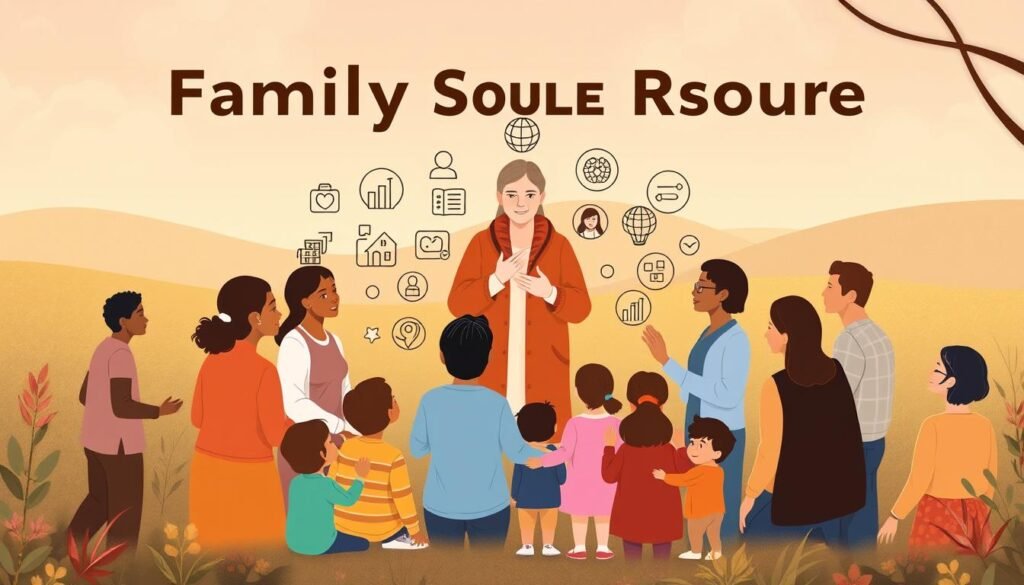Millions of Americans face mental health and substance use challenges every year. If you or someone you know is struggling, it’s important to know that help is available. This guide is here to provide you with a comprehensive list of resources and support options tailored to your needs.
Seeking help early can make a significant difference in recovery. With the right resources, you can navigate through challenging times more effectively. Whether you’re looking for professional therapy, local health services, or online support communities, this guide will cover it all.
Key statistics reveal that mental health issues affect millions of people across the United States. For immediate assistance, you can call or text 988 to reach the Suicide & Crisis Lifeline. This service offers free and confidential support 24/7.

This article serves as a one-stop resource hub for mental health and substance use concerns. We aim to provide clear, informative, and supportive guidance to help you find the assistance you need.
Key Takeaways
- Mental health and substance use disorders affect millions of Americans.
- Early intervention is crucial for effective recovery.
- Resources include professional therapy, local health services, and online communities.
- The Suicide & Crisis Lifeline (call or text 988) offers immediate support.
- This guide provides a comprehensive list of support options.
The Importance of Mental Health in Today’s Society
Mental well-being is a cornerstone of a thriving society, influencing every aspect of life from personal relationships to workplace productivity. In the United States alone, over 50 million adults experience a mental illness each year, highlighting the urgent need for awareness and action.
Understanding Mental Health Disorders
Mental health encompasses emotional, psychological, and social well-being, affecting how individuals handle stress, relate to others, and make decisions. Common disorders include anxiety, depression, and bipolar disorder, each presenting unique challenges. For instance, anxiety disorders affect over 19% of adults annually, often hindering daily life and relationships.
| Disorder | Prevalence | Impact |
|---|---|---|
| Anxiety Disorders | 19.1% of adults | Impedes daily functioning and relationships |
| Depressive Disorders | 8.4% of adults | Leads to emotional distress and reduced productivity |
| Bipolar Disorder | 2.8% of adults | Causes extreme mood swings affecting all aspects of life |
Benefits of Early Intervention
Identifying and addressing mental health issues early can significantly improve outcomes. For example, early intervention for substance abuse can prevent progression to more severe addiction. Programs like the 988 Suicide & Crisis Lifeline demonstrate the effectiveness of timely support, offering immediate assistance and connecting individuals with vital services.
Navigating the Mental Health System in the United States
Navigating the mental health system in the U.S. can be complex due to varying state laws and licensing requirements. Each state has its own approach to credentialing professionals and structuring services, which can affect the availability and quality of care.
State-by-State Approaches and Licensing Requirements
Understanding these differences is crucial for accessing appropriate services. For example, some states require higher credentials for therapists, while others may have more flexible rules, impacting service availability, especially in rural areas.
| State | Licensing Requirements | Service Availability |
|---|---|---|
| California | Strict licensing for professionals | Broad services, including specialized programs |
| Texas | Less stringent requirements | More accessible rural services |
| New York | High educational standards | Urban areas have multiple options |
Local policies also influence accessibility. For instance, states with expanded Medicaid often offer more comprehensive coverage for crisis prevention and suicide prevention resources.
To find reputable care, check state licensing boards and utilize directories like SAMHSA. Understanding these factors can help you make informed decisions about your care.
mental health resources and support options
Accessing the right care is essential for addressing mental health and substance use challenges. A well-organized approach ensures you can find the help you need efficiently.
Behavioral health services combine mental wellness with physical health, offering a holistic approach to care. These services address the whole person, promoting overall well-being and resilience in daily life.

Support groups provide peer assistance, fostering a sense of community and connection. Sharing experiences with others who understand can be incredibly empowering and healing.
Parents and caregivers can find specialized resources to support their families. National agencies like SAMHSA offer directories and tools to help locate these services, ensuring access to the right care.
Whether you’re seeking emergency crisis support or long-term therapy, understanding the types of services available can guide you toward the best solutions for your needs.
Immediate Crisis Support and Hotline Services
In times of crisis, immediate support is crucial. Hotlines and crisis services play a vital role in providing urgent care and saving lives.
24/7 Crisis Counseling and Support
Crisis counseling is available round the clock, offering immediate assistance to those in need. The 988 Suicide & Crisis Lifeline is a key service, accessible by call or text. This service is free and confidential, ensuring help is just a moment away.
Essential Hotlines for Emergency Situations
For substance abuse emergencies, the SAMHSA National Helpline is available at 1-800-662-HELP (4357). This hotline provides referrals and information for treatment. Coordination between national organizations and local services ensures comprehensive support during crises.
These hotlines are essential for immediate intervention, offering guidance and connecting individuals with necessary services. Their impact is evident in success stories where timely help made a significant difference.
Finding Professional Guidance and Specialized Therapy
When seeking help for mental well-being, understanding the types of professionals available is key. Each specializes in different areas, ensuring you find the right fit for your needs.
Overview of Mental Health Professionals
Professionals in this field include psychiatrists, psychologists, licensed counselors, and social workers. Psychiatrists can prescribe medication, while psychologists often focus on therapeutic techniques. Licensed counselors and social workers provide talk therapy and connect clients with community resources.
- Psychiatrists: Medical doctors who prescribe medication.
- Psychologists: Experts in therapy techniques and behavioral science.
- Licensed Counselors: Provide talk therapy and support.
- Social Workers: Connect clients with community services.
What to Expect During Therapy Sessions
The initial consultation is a chance to discuss your concerns and goals. Ongoing sessions focus on strategies to manage challenges and improve well-being. It’s important to ask questions and ensure a good personal fit with your therapist.
Accessing Treatment for Substance Abuse and Dual Diagnosis
Tackling substance abuse and dual diagnosis requires a comprehensive approach that addresses both physical and emotional needs. These conditions often present unique challenges, making it essential to find the right treatment programs.
Behavioral Health and Substance Use Services
Behavioral health services are designed to treat both mental health and substance abuse simultaneously. This integrated approach helps individuals address underlying issues that may contribute to their addiction. For example, the national alliance of healthcare providers offers specialized programs that combine therapy and medication management.
Local and National Treatment Resources
Locating treatment can be overwhelming, but resources like the SAMHSA helpline (1-800-662-HELP) and referral services such as 211 can guide you to local and national programs. These services provide directories and tools to find the best fit for your needs, ensuring access to alliance mental health support.
Ongoing recovery and support are crucial for long-term success. Peer support groups and counseling can provide the necessary encouragement and strategies to maintain sobriety. Remember, seeking help is the first step toward healing and a better life.
Utilizing Community and Peer Support Networks
Building a strong support system is vital for overcoming challenges. Community and peer networks offer invaluable assistance, fostering resilience and providing practical solutions for recovery.
Benefits of Joining Support Groups
Support groups provide a safe space for individuals to share experiences and strategies. They help reduce stress and isolation, offering a sense of belonging and understanding.
| Group Type | Focus | Benefits |
|---|---|---|
| Alcoholics Anonymous (AA) | Alcohol recovery | Peer-led support and accountability |
| Narcotics Anonymous (NA) | Substance abuse | Shared experiences and coping techniques |
| SMART Recovery | Behavioral change | Science-based strategies for recovery |
These groups complement professional treatment, offering ongoing support and guidance. Directories like 211 and SAMHSA can help locate local options, ensuring access to the right care.
Leveraging Online Resources and Directories
Discovering the right treatment for mental health and substance use challenges can be simplified with online tools. These resources offer a guide to finding care efficiently.
Using 211 and SAMHSA Tools for Referrals
Online directories like 211 and SAMHSA’s Treatment Locator provide easy access to local services. Here’s how to navigate them:
- Visit the 211 website or call 211 to find nearby services.
- Use SAMHSA’s Treatment Locator for detailed provider information.
These tools help assess risk factors and find tailored services, ensuring timely support. For example, the 211 service connects users with food and housing assistance, while SAMHSA offers treatment referrals.
Combining online research with local outreach ensures comprehensive care. These directories are free, confidential, and immediately accessible, making them invaluable for timely support.
Support for Families, Caregivers, and Youth
Families and caregivers play a vital role in supporting loved ones facing mental health or substance use challenges. Access to tailored resources and tools can make a significant difference in their journey toward recovery and well-being.
Family Support and Parenting Resources
Specialized programs are available to help families navigate mental health challenges. The 988 Suicide & Crisis Lifeline offers immediate assistance for anyone in distress, including families in crisis situations. Local health services and national organizations provide directories and tools to locate the best fit for your needs.
| Resource Type | Details | Benefits |
|---|---|---|
| Family Support Groups | Peer-led groups for caregivers | Shared experiences and strategies |
| Parenting Workshops | Guidance on supportive parenting | Improved family dynamics |
| Online Directories | Tools to find local services | Efficient access to care |

Resources for Children’s and Adolescent Mental Health
Addressing mental health early in children and adolescents is crucial. The 988 suicide crisis line is available for immediate help, while community programs offer educational support. Integrating professional treatment with familial and community support ensures lasting recovery.
- Hotlines: 988 for crisis situations
- Community Programs: Educational and supportive services
- Online Tools: Directories for local services
Conclusion
In conclusion, addressing mental health and substance use challenges requires a proactive and informed approach. This guide has provided a comprehensive overview of available resources, from crisis hotlines like 988 to directories such as SAMHSA. Early intervention, professional guidance, and community support are crucial for effective recovery.
To take action, consider reaching out to local services through 211 or utilizing online tools for tailored support. Engaging with policies and resources can lead to better outcomes. Remember, help is always available, and informed decisions are the first step toward healing.
FAQ
What is the 988 Suicide & Crisis Lifeline?
The 988 Suicide & Crisis Lifeline is a 24/7 service providing free and confidential support for individuals in suicide crisis or experiencing distress. It connects callers to trained crisis counselors in their area. This service is available to anyone in the U.S. and is a critical tool for suicide prevention.
How can I find local substance use treatment centers?
You can locate local substance use treatment centers through the Substance Abuse and Mental Health Services Administration (SAMHSA) national helpline at 1-800-662-HELP (4357). They also offer an online treatment locator tool to find behavioral health services near you.
What is the difference between substance use disorder and substance abuse?
Substance use disorder is a medical diagnosis that describes a pattern of problematic substance use, leading to significant impairment or distress. Substance abuse is an older term that generally refers to the misuse of substances but is no longer used as a clinical diagnosis. Both terms are related to substance use treatment.
Are there support groups specifically for caregivers of individuals with mental illness?
Yes, organizations like the National Alliance on Mental Illness (NAMI) offer support groups and resources specifically for caregivers. These groups provide a space to share experiences and receive guidance on navigating mental health services and substance use recovery.
Can children access mental health services through school?
Many schools offer mental health services for children, including counseling and referrals to behavioral health professionals. Parents can contact school administrators to learn about available programs for their child’s mental health treatment.
What resources are available for suicide prevention in rural areas?
Rural areas can access the same 988 Suicide & Crisis Lifeline as urban regions. Additionally, local community centers and health services often provide suicide prevention training and support groups to address unique challenges in rural settings.
How do I know if someone is at risk for substance use disorder?
Signs may include increased tolerance to substances, withdrawal symptoms, or neglecting responsibilities due to substance use. If you suspect someone is at risk, encourage them to seek treatment from a licensed behavioral health professional.
What is the role of the National Alliance on Mental Illness (NAMI) in mental health services?
NAMI provides education, advocacy, and support groups for individuals and families affected by mental illness. They also offer resources for understanding substance use recovery and navigating the mental health system.
Can I access recovery programs for alcohol abuse without insurance?
Yes, many recovery programs offer sliding-scale fees or are free of charge. The SAMHSA helpline can help you find affordable substance use treatment options in your area.
How can parents identify early signs of mental health challenges in their child?
Parents should watch for changes in mood, behavior, or academic performance. Early intervention is key, and consulting a behavioral health professional can provide guidance and treatment options for children.
What is the purpose of the 211 helpline?
The 211 helpline connects individuals to local health services, substance use treatment, and community resources. It is a valuable tool for finding assistance with mental health, housing, and other needs.





